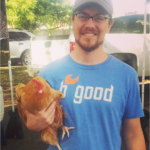Are You Going To Eat That?
By Lucas Land
One summer, when I was in college, I worked at a Lutheran camp in the Rocky Mountains. The camp had a high population of what has come to be called “crunchy” types. Many of my peers at this camp were vegetarians. Now, I grew up in Texas and can’t remember a meal from my childhood that didn’t have meat in it. I wasn’t sure about giving up meat, but I was inspired by their passion for social justice and their faith.
So, mostly as an experiment, that Christmas I decided to give up meat and try a vegetarian diet. I was really nervous that it might make me sick. I had never NOT eaten meat. But I didn’t get sick. I didn’t wither away or become too weak to stand. Then I read Fast Food Nation by Eric Schlosser on a plane to Japan to visit my girlfriend, now wife. I thought to myself, “I keep finding more reasons to be vegetarian. I think I’ll stick with it.” I was vegetarian for nine years after that.
Lest you think my newfound diet bestowed some sort of righteousness on me, let me say that I was (and am) pretty lazy when it comes to food. I might have thought a lot about food, but when it came to the act of satisfying my hunger at any given moment a frozen pizza worked as well as anything (and was vegetarian too).
My little experiment with vegetarianism led me to ask more questions about what I was eating, where it came from, and what that meant for myself, other people and the planet. It’s a rabbit trail I’m still traveling down. The trail has connected up with a lot of other trails along the way, as I realized that the way our food is produced is connected to so many issues.
If you care about women’s issues, you should care about agriculture. The majority of the world’s farmers are women. If you care about immigration, then you should think about the conditions of those who are growing and harvesting your food. If you care about poverty, you have to think about what kind of food is available to people in food deserts like East Waco, and how that affects rates of obesity and diabetes.
Thinking about the food we eat is an entry point to thinking about a lot of different issues. This is what led me to leave a comfortable life with a house payment and steady income and move with my wife and two young kids to World Hunger Relief, Inc. (WHRI) for their internship program. I know the next step in my own journey is controversial among some vegetarians, vegans and environmentalists, but after moving to WHRI I felt like I could start eating meat again. I knew the animals that fed me and the conditions they were raised in. I was willing to butcher them which was (and still is) an emotional, difficult, and meaningful experience.
Reducing or eliminating your consumption of meat is still one of the best things you can do to reduce your carbon footprint and to combat climate change. A recent article from Salon spells out the link between meat consumption and climate change. The difference for me now when I eat local meat, or chickens that I’ve raised, is that I’m more mindful and connected to the source and consequences of what I’m eating. I could dedicate a whole other article just to this topic (and maybe I will).
What I realized through my own journey is that raising our consciousness and awareness of these issues is the most important and perhaps hardest part of working towards sustainability. Our year at the farm was one of exploring, learning, and deepening our commitment to a more sustainable world related to food, agriculture and every area of our lives. Ultimately, sustainability is about finding ways for humans to thrive alongside the rest of the ecosystems and environments that make up our habitat. This requires us to be more aware of the way the food we eat, and other aspects of our lives that we take for granted, affect the climate and environment, from our local watershed to the interconnected global system that sustains life on this planet we call home.
 Lucas Land is an eco-theologian, urban farmer, activist, aspiring master naturalist, facilitator, musician, and writer. He is avoiding growing up by constantly learning and trying new things. He also works in Grants Management for Waco ISD. He lives with his wife, three children, flock of chickens, dog, and cat in the Sanger Heights Neighborhood in North Waco.
Lucas Land is an eco-theologian, urban farmer, activist, aspiring master naturalist, facilitator, musician, and writer. He is avoiding growing up by constantly learning and trying new things. He also works in Grants Management for Waco ISD. He lives with his wife, three children, flock of chickens, dog, and cat in the Sanger Heights Neighborhood in North Waco.
The Act Locally Waco blog publishes posts with a connection to these aspirations for Waco. If you are interested in writing for the Act Locally Waco Blog, please email [email protected] for more information.
